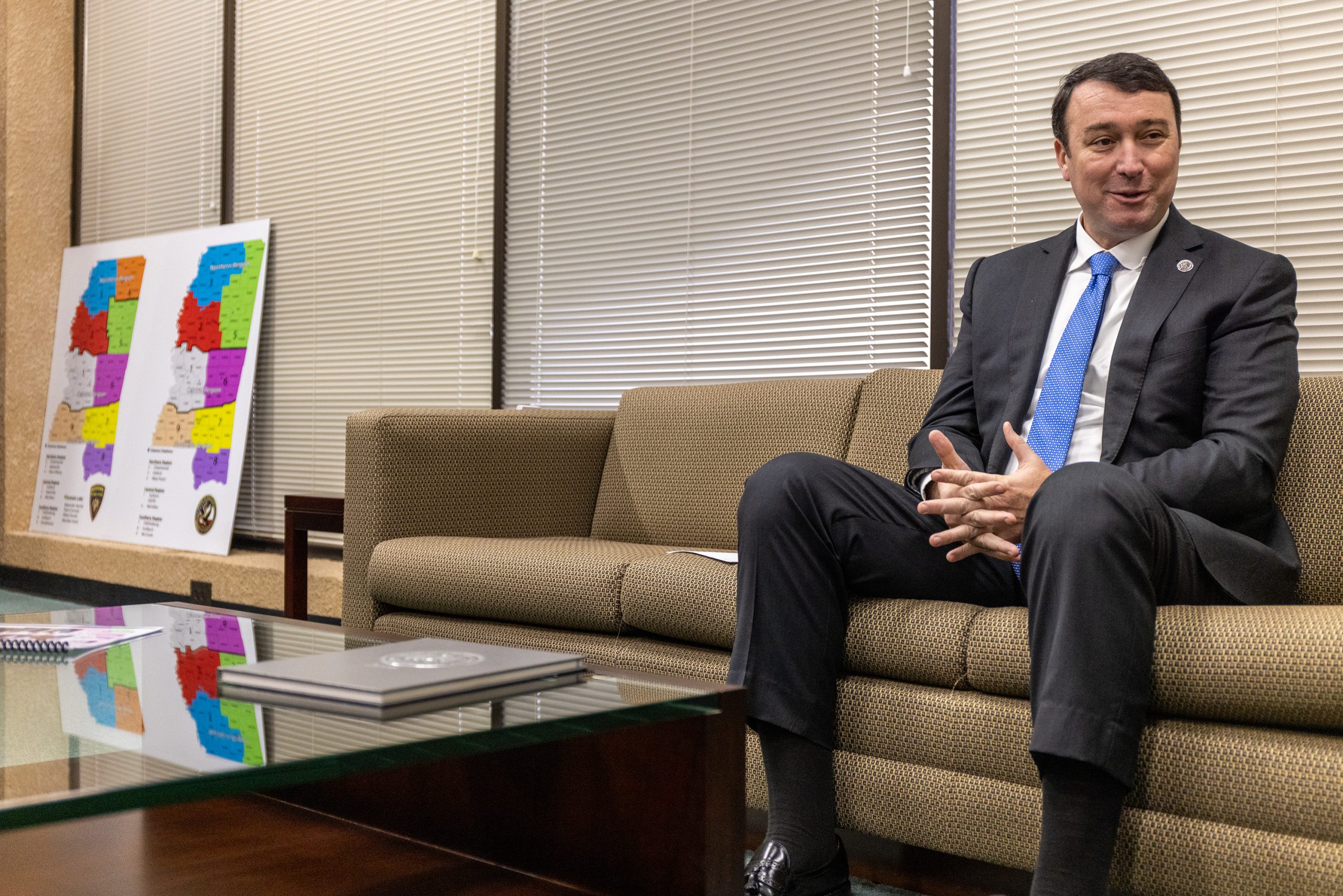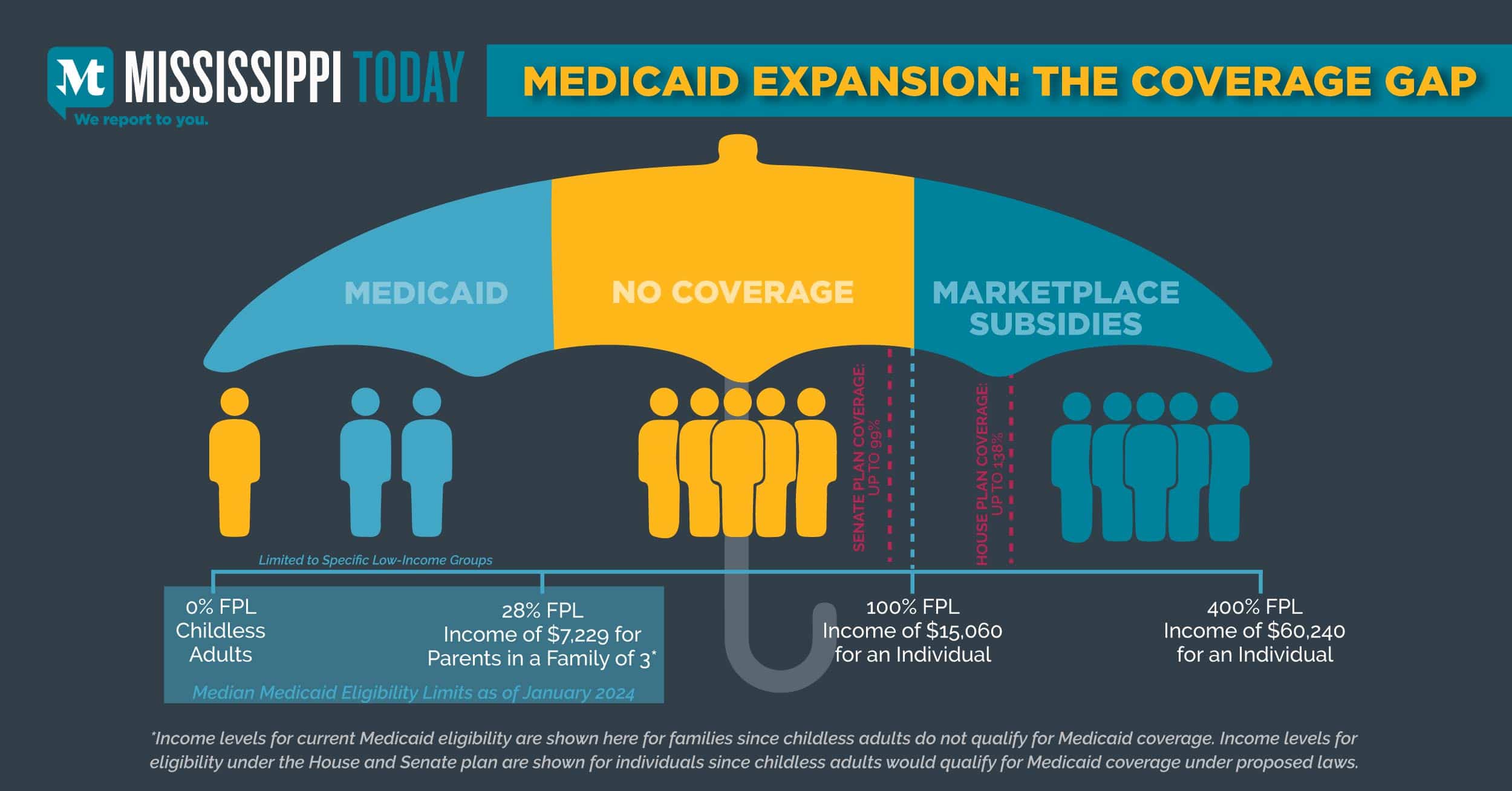Mississippi Today
Bill seeks to keep public at a distance in videoing law enforcement actions

Bill seeks to keep public at a distance in videoing law enforcement actions
Anyone who video records Mississippi law enforcement during the performance of their duties in a public space could face a fine and jail time if they are less than 15 feet away, under a bill before the Legislature.
House bill 448 by Rep. Jill Ford, R-Madison, would make it a misdemeanor offense and set a fine for anyone who knowingly records law enforcement activity while less than 15 feet away after an officer has given “a clear, verbal instruction” to step back.
Ford referred comment about the bill to Department of Public Safety Commissioner Sean Tindell, and also reached out to him for input. Tindell said the legislation would provide guidance to the public and law enforcement that 15 feet is the minimum for a perimeter, which would allow an officer to work without interference and a person to record.
“Fifteen feet is five steps. There is nothing that they can't still record from five steps away,” Tindell told Mississippi Today. “It's close enough if you want to film the interaction with law enforcement.”
Videotaping law enforcement during arrests has intensified in the wake of the 2020 death of George Floyd in Minneapolis. A teenager captured cellphone video of Derek Chauvin kneeling on Floyd's neck as he pleaded for his life, and that video became the key to a murder conviction for the former police officer.
The Mississippi bill states that it will not create a right or authorize anyone to record law enforcement activity.
That right already exists within the First Amendment and case law, including a 2017 5th U.S. Circuit Court of Appeals decision stating the First Amendment covers an individual's right to record the police while they carry out their duties.
“Filming the police contributes to the public's ability to hold the police accountable, ensure that police officers are not abusing their power, and make informed decisions about police policy,” the court wrote in its decision. “Filming the police also frequently helps officers; for example, a citizen's recording might corroborate a probable cause finding or might even exonerate an officer charged with wrongdoing.”
Tindell said the bill is in response to an Aug. 5 interaction in McComb between Eugene Lewis, a Black man, and Mississippi Highway Patrol Trooper Hayden Falvey, who is white.
One of Lewis' brothers, Packer Lewis, recorded a 5-minute Facebook video that shows Falvey dragging Eugene Lewis a few feet, wrestling him onto the grass and holding Lewis down with a knee.
Several times Packer Lewis talks to the trooper and the trooper tells him to stay back, including after Packer Lewis steps closer. After the trooper put Eugene Lewis into his car, Falvey arrested Packer Lewis and another brother at the scene, Darius Lewis.
A week later, DPS released a statement and 40 minutes of camera footage of the incident and said an internal investigation of the trooper didn't find evidence of criminal conduct against Eugene Lewis.
The agency said Falvey stopped the car for speeding and other traffic violations. The trooper also smelled burned marijuana and saw Eugene Lewis' eyes were glassy and bloodshot, according to the statement.
“It created somewhat of a potentially volatile situation,” Tindell later told Mississippi Today about the behavior of Eugene Lewis' brothers at the scene and the trooper not being able to maintain a perimeter.
Existing case law allows law enforcement to set reasonable perimeters, and Tindell said sometimes there is a need for a greater distance, such as at a crime scene, which can be a 50-foot perimeter.
Under HB 448, a person could face up to six months in county jail and/or a fine between $500 and $1,000. The fine and jail time doubles for additional convictions.
There are exceptions in the bill: Recording from under 15 feet can happen during a traffic stop by the driver or passengers and while on private property in an enclosed structure with authority from the owner.
Tindell said DPS trains its officers about citizens' right to record and how to establish a perimeter to conduct an investigation. If the bill passes, the only thing that will change for the agency is the ability to teach about the statute and tell law enforcement that they can cite it, he said.
Tindell has spoken with members of law enforcement who said they support the legislation.
“What this bill does, in my mind, is set forth reasonable parameters by which the public is aware as well as the law enforcement officer is aware of each other's rights and dues,” he said.
The American Civil Liberties Union in Misissippi has a resource on its website about police encounters that includes the right to film, photograph and record the police.
As long as a person does not interfere with police activity or obstruct movements, the person has a right to observe and record events plainly visible in public spaces, according to the guide. A person also doesn't have to hide the fact they are recording because police don't have a reasonable expectation of privacy when doing their jobs.
The police can't demand to see the recording or photo device without a warrant, and they can't delete the images, videos or recordings, according to the guide.
A representative from the ACLU of Mississippi was not immediately available for comment.
But the national ACLU is challenging a law passed last year in Arizona establishing that a person must stay eight feet away when recording law enforcement.
“This law is a violation of a vital constitutional right and will severely thwart attempts to build police accountability,” the organization said in a statement. “It must be struck down before it creates irreparable community harm.”
As far as Mississippi's proposed bill, Tindall said it would be up to law enforcement and agencies to use the correct level of discretion with how to apply HB 448. If the bill is passed, a court could determine whether a law enforcement officer misapplied the law and if the officer's decision went beyond the bounds of reasonableness, he said.
Tindell doesn't see the Mississippi bill as a threat to the First Amendment or transparency. As DPS commissioner, he said his goal for the agency is transparency to allow for accountability and build trust with the public.
“I'm confident that should (the bill) make it through the process and become law, it will be fully vetted and be a good law in which the public and law enforcement understand and respect,” he said.
HB 448 is under consideration by the Judiciary B Committee. Tuesday is the deadline for all committees to report out bills to be considered by the full House of Representatives or Senate.
This article first appeared on Mississippi Today and is republished here under a Creative Commons license.
Did you miss our previous article…
https://www.biloxinewsevents.com/?p=205880
Mississippi Today
Mississippi Capitol sees second day of hundreds rallying for ‘full Medicaid expansion now’

Hundreds of people rallied at the Mississippi Capitol for a second day Wednesday, urging lawmakers to expand Medicaid to provide health coverage for an estimated 200,000 Mississippians.
After faith leaders spoke at the Capitol on Tuesday, Care4Mississippi, a coalition of advocates, held a rally Wednesday. Speakers recounted their struggles with access to affordable health care in Mississippi and chanted for the Legislature to, “Close the coverage gap now,” and for “Full Medicaid expansion now.”
Stephanie Jenkins of McComb, a former social worker, lost her job and health insurance after a car wreck left her with debilitating injuries.
She said she later received some medical treatment from the University of Mississippi Medical Center, but still suffers from chronic pain and other ailments. She said she was told she could not receive Medicaid coverage because she owns too much property.
Jenkins said that years after her accident, “I'm still fighting that battle. I'm still trying to get health insurance. I am still trying to get Medicaid … The state of Mississippi does not realize that it is not about money. It is not about race. It is about people. People are dying because they have no health insurance.”
Dr. Randy Easterling, a Vicksburg family physician and former executive director of the Mississippi Medical Association, spoke in favor of Medicaid expansion. He said the people who would be helped by the expansion primarily work at jobs that do not provide health care and they do not earn enough to purchase private insurance. Many are small business owners.
Easterling said often times the insurance policies available through the federal marketplace exchange have out-of-pocket costs that make them unaffordable for working people if they get sick.
Easterling recounted a story of two of his friends diagnosed with similar cancers. One was uninsured and self-employed, and did not get early diagnosis or treatment. He's now in hospice and on death's door. The other friend, with insurance, received an early diagnosis and treatment and is now cancer free.
“This is a matter of life and death. It is certainly more than a political debate,” Easterling told the crowd.
But the issue of expanding Medicaid is currently engulfed in the political process of the Mississippi Legislature. The House has passed a bill to expand Medicaid as is allowed under federal law to cover those earning up to 138% of the federal poverty or about $20,000 annually for an individual. Under the House plan, the federal government would pay 90% of the health care costs and provide the state with almost $700 million more over the first two years as incentive to expand Medicaid as 40 other states have done.
READ MORE: Experts analyze House, Senate Medicaid expansion proposals, offer compromise plan
Under the Senate plan, coverage would be provided to working people earning less than 100% of the federal poverty level and the federal government would pay much less of the costs.
Studies indicate that the Senate plan would cost the state more and cover fewer people. At the rally, people wore yellow T-shirts that read, “close the coverage gap” and “leave no one behind.”
Easterling said that by refusing to expand Medicaid for the last 11 years, “This state has struck a match to $12 billion … and that money was earmarked specifically to increase access to health care.”
He added, “Two days ago most of us wrote a check to the IRS. Now explain to me in simple terms, I am pretty simple, why my (federal) tax money in Mississippi went to increase access to health care in 40 states and not any of it came back to Mississippi.”
“We take federal money right and left,” Easterling said. “We take hundreds of millions of federal dollars for highways, education, the Health Department, law enforcement and natural disasters … But for some reason we push back on additional money for health care. I would submit to you this is a matter of life and death.”
Robin Y. Jackson, with the Mississippi Black Women's Roudtable, told of dropping out of school to care for a family member. In the process she developed a chronic health problem. She said she was unable to get help, but later got a job with health insurance even though her employer knew she had costly medical maladies. After surgeries costing tens of thousands of dollars, she said she is finally well.
“I was lucky,” she said. Others are not so lucky. She said with Medicaid expansion everyone could receive the treatment she was lucky enough to receive.
She said as shepherds of Mississippians, politicians should strive “to leave no one behind.”
Sonya Williams Branes, a former legislator, a small business owner and state policy director for the Southern Poverty Law Center, recounted the struggles she faced with her young son who had chronic asthma. As a small business owner at the time, she struggled to provide health care for her family and her employees.
“To ensure my son remained eligible for CHIP, a program that provided him with vital medical care, I was forced into a corner,” Barnes said. “Making more money, expanding my business and hiring more staff – all paths to improving our lives – would disqualify him from the program, pushing essential health care out of reach.
“Our system is broken,” Barnes said. “It punishes ambition and stifles growth.”
Before the Care4Mississippi rally, the Legislative Black Caucus on Wednesday morning held a press conference calling for adoption of the House's more expansive Medicaid coverage plan.
“We remain committed to having full expansion and covering as many working Mississippians as possible,” said House Minority Leader Robert Johnson, D-Natchez. “Our goal is to sustain health care in Mississippi and sustain it in a way that it doesn't matter where you live or what your income is.”
This article first appeared on Mississippi Today and is republished here under a Creative Commons license.
Mississippi Stories
Mississippi Stories: Natalie Moore
Mississippi Stories: Natalie Moore
In this episode of Mississippi Stories, Mississippi Today Editor-at-Large Marshall Ramsey sits down with Natalie Moore, Peer Wellness Support Services Coordinator for the Mississippi Mental Health Association. Moore and Ramsey share their experiences battling mental health issues and the Congregational Recovery Outreach Program's upcoming mental health summit.
CROP is a faith-based, grant program that aims to help individuals recovering from substance use disorders and mental illnesses.
This article first appeared on Mississippi Today and is republished here under a Creative Commons license.
Mississippi Today
On this day in 1863
April 17, 1863

As darkness fell on San Francisco, a young Black woman named Charlotte Brown walked a block from her home on Filbert Street and took a seat on the “whites-only” horse-drawn streetcar.
She and her family had moved to California from Maryland, a part of the city's burgeoning Black middle class. Her father, James E. Brown, was an anti-slavery crusader and was a partner in the Black newspaper, Mirror of the Times.
When the conductor came to collect tickets, she handed him the ticket she had purchased, only for him to refuse to take it.
“He replied that colored persons were not allowed to ride,” she later testified. “I told him I had been in the habit of riding ever since the cars had been running. I answered that I had a great ways to go and I was later than I ought to be.”
The conductor asked her several times to leave. Each time she refused. When a white woman objected to her presence, the conductor grabbed her by the arm and forced her off the streetcar. She boarded twice more with the same result and sued.
Two years later, a jury awarded her the huge sum in her day of $500 (streetcar tickets were just 5 cents), and a judge ruled that barring passengers on the basis of race was illegal. He wrote in his ruling that he had no desire to “perpetuate a relic of barbarism.”
Her victories paved the way for the official end of racial discrimination on streetcars in San Francisco and beyond.
This article first appeared on Mississippi Today and is republished here under a Creative Commons license.
-
Mississippi News4 days ago
Mississippi will soon be bombarded with cicadas
-
SuperTalk FM3 days ago
4 tornadoes touched down in Mississippi during latest round of severe storms
-
SuperTalk FM4 days ago
2 Jones County correctional officers arrested in smuggling bust
-
Mississippi News5 days ago
Columbus schools may see needed upgrades with bond issue
-
Local News4 days ago
Almost 3,500 Mississippi Veterans have enrolled in VA health care in past 365 days, 28% increase over last year
-
SuperTalk FM19 hours ago
Chance of parole denied for man who killed 3 Choctaw Indian tribal members
-
Kaiser Health News21 hours ago
To Stop Fentanyl Deaths in Philadelphia, Knocking on Doors and Handing Out Overdose Kits
-
SuperTalk FM6 days ago
Explosion at elementary school in Mississippi Delta hospitalizes two employees







































